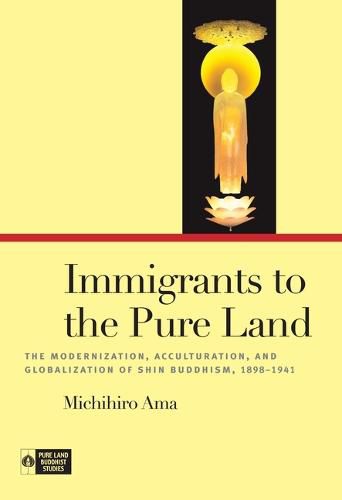Readings Newsletter
Become a Readings Member to make your shopping experience even easier.
Sign in or sign up for free!
You’re not far away from qualifying for FREE standard shipping within Australia
You’ve qualified for FREE standard shipping within Australia
The cart is loading…






Religious acculturation is typically seen as a one-way process: The dominant religious culture imposes certain behavioral patterns, ethical standards, social values, and organizational and legal requirements onto the immigrant religious tradition. In this view, American society is the active partner in the relationship, while the newly introduced tradition is the passive recipient being changed. Michihiro Ama's investigation of the early period of Jodo Shinshu in Hawai'i and the United States sets a new standard for investigating the processes of religious acculturation and a radically new way of thinking about these processes.
Most studies of American religious history are conceptually grounded in a European perspectival position, regarding the U.S. as a continuation of trends and historical events that begin in Europe. Only recently have scholars begun to shift their perspectival locus to Asia. Ama's use of materials spans the Pacific as he draws on never-before-studied archival works in Japan as well as the U.S. More important, Ama locates immigrant Jodo Shinshu at the interface of two expansionist nations. At the end of the nineteenth and beginning of the twentieth centuries, both Japan and the U.S. were extending their realms of influence into the Pacific, where they came into contact-and eventually conflict-with one another. Jodo Shinshu in Hawai'i and California was altered in relation to a changing Japan just as it was responding to changes in the U.S. Because Jodo Shinshu's institutional history in the U.S. and the Pacific occurs at a contested interface, Ama defines its acculturation as a dual process of both "Japanization" and "Americanization."
Immigrants to the Pure Land explores in detail the activities of individual Shin Buddhist ministers responsible for making specific decisions regarding the practice of Jodo Shinshu in local sanghas. By focusing so closely, Ama reveals the contestation of immigrant communities faced with discrimination and exploitation in their new homes and with changing messages from Japan. The strategies employed, whether accommodation to the dominant religious culture or assertion of identity, uncover the history of an American church in the making.
$9.00 standard shipping within Australia
FREE standard shipping within Australia for orders over $100.00
Express & International shipping calculated at checkout
Religious acculturation is typically seen as a one-way process: The dominant religious culture imposes certain behavioral patterns, ethical standards, social values, and organizational and legal requirements onto the immigrant religious tradition. In this view, American society is the active partner in the relationship, while the newly introduced tradition is the passive recipient being changed. Michihiro Ama's investigation of the early period of Jodo Shinshu in Hawai'i and the United States sets a new standard for investigating the processes of religious acculturation and a radically new way of thinking about these processes.
Most studies of American religious history are conceptually grounded in a European perspectival position, regarding the U.S. as a continuation of trends and historical events that begin in Europe. Only recently have scholars begun to shift their perspectival locus to Asia. Ama's use of materials spans the Pacific as he draws on never-before-studied archival works in Japan as well as the U.S. More important, Ama locates immigrant Jodo Shinshu at the interface of two expansionist nations. At the end of the nineteenth and beginning of the twentieth centuries, both Japan and the U.S. were extending their realms of influence into the Pacific, where they came into contact-and eventually conflict-with one another. Jodo Shinshu in Hawai'i and California was altered in relation to a changing Japan just as it was responding to changes in the U.S. Because Jodo Shinshu's institutional history in the U.S. and the Pacific occurs at a contested interface, Ama defines its acculturation as a dual process of both "Japanization" and "Americanization."
Immigrants to the Pure Land explores in detail the activities of individual Shin Buddhist ministers responsible for making specific decisions regarding the practice of Jodo Shinshu in local sanghas. By focusing so closely, Ama reveals the contestation of immigrant communities faced with discrimination and exploitation in their new homes and with changing messages from Japan. The strategies employed, whether accommodation to the dominant religious culture or assertion of identity, uncover the history of an American church in the making.